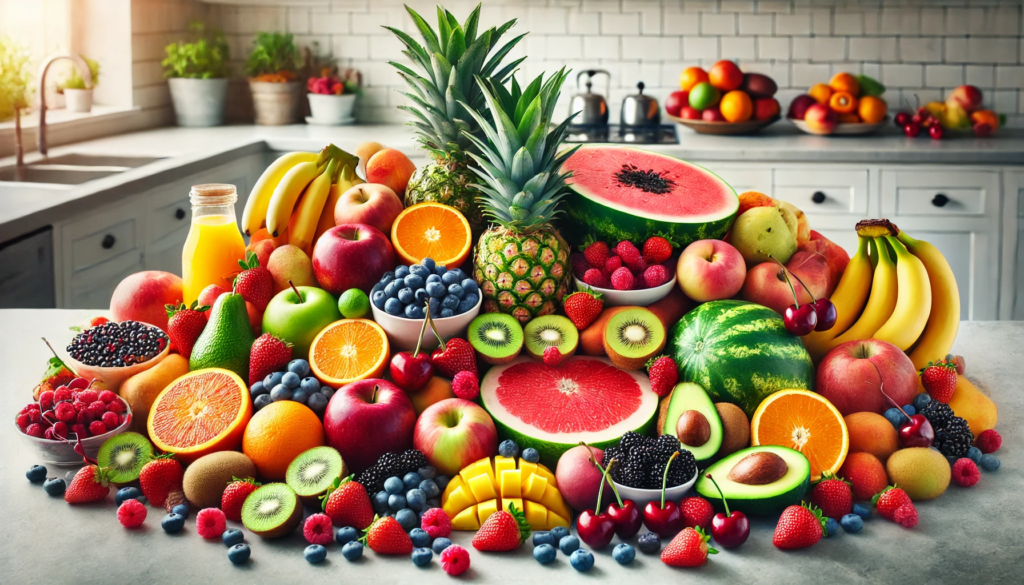
Top 20 Healthiest Fruits to Add to Your Diet
Incorporating a variety of fruits into your diet can boost your nutrient intake, support overall health, and add delicious flavors to your meals. Fruits are rich in vitamins, minerals, fiber, and antioxidants, making them a fantastic addition to any balanced diet. Here are the top 20 healthiest fruits you should consider adding to your daily nutrition.
1. Apples
Apples are a convenient, fiber-rich fruit that supports heart health, aids in digestion, and helps regulate blood sugar levels. They are also a good source of vitamin C and antioxidants, which can help protect cells from damage. Enjoy them as a snack or in salads and desserts.
2. Bananas
Bananas are known for their high potassium content, which supports muscle and nerve function. They also provide quick energy due to their natural sugars and fiber, making them an ideal pre- or post-workout snack. Bananas are also beneficial for digestive health.
3. Blueberries
Blueberries are packed with antioxidants, particularly vitamin C and anthocyanins, which support brain function and reduce inflammation. They are also known for promoting heart health and improving memory. Add blueberries to smoothies, oatmeal, or yogurt for a nutritious boost.
4. Oranges
Oranges are an excellent source of vitamin C, which supports the immune system and skin health. They also contain fiber, potassium, and several B vitamins that help with energy production. Enjoy oranges on their own or add them to salads and juices.
5. Strawberries
Strawberries are high in vitamin C, manganese, and antioxidants, which can help reduce inflammation and support heart health. They are also low in calories, making them a great choice for weight management. Use them in smoothies, desserts, or as a topping for yogurt.
6. Avocados
Avocados are unique because they are rich in healthy monounsaturated fats rather than sugars. They support heart health, improve digestion, and are packed with fiber, potassium, and vitamins C, E, and K. Add avocado to salads, smoothies, or toast for a creamy and nutritious addition.
7. Pomegranates
Pomegranates are known for their high levels of antioxidants, which can help reduce inflammation and protect against chronic diseases. They also support heart health and improve digestion. Enjoy the seeds on their own or add them to salads and desserts.
8. Cherries
Cherries, especially tart cherries, are rich in antioxidants and anti-inflammatory compounds that help reduce muscle soreness and support joint health. They are also a good source of vitamin C and potassium. Add them to smoothies, desserts, or eat them fresh as a snack.
9. Grapes
Grapes, particularly red and purple varieties, contain resveratrol, a powerful antioxidant that supports heart health. They are also rich in vitamins C and K, which support immune function and bone health. Eat grapes as a refreshing snack or add them to salads.
10. Kiwi
Kiwi is a nutrient-dense fruit that provides vitamin C, vitamin K, fiber, and potassium. It supports digestive health, boosts the immune system, and improves skin health. The fuzzy skin is also edible and adds extra fiber, but you can peel it if preferred.
11. Pineapple
Pineapple is high in vitamin C and contains bromelain, an enzyme that helps with digestion and reduces inflammation. It also supports immune function and bone health. Enjoy pineapple fresh, in smoothies, or as a tropical addition to salads and desserts.
12. Watermelon
Watermelon is hydrating and refreshing, containing over 90% water. It is also a good source of vitamins A and C, which support skin health and immune function. The fruit’s natural sweetness makes it a perfect summer treat.
13. Mango
Mango is rich in vitamins A and C, as well as fiber and several antioxidants that support eye health and immune function. It also promotes digestive health and adds a delicious tropical flavor to your diet. Enjoy mango fresh, in smoothies, or as a topping for yogurt.
14. Papaya
Papaya contains an enzyme called papain, which aids digestion. It is also rich in vitamin C, vitamin A, and fiber, promoting healthy skin and boosting immune function. Add papaya to fruit salads, smoothies, or enjoy it fresh.
15. Raspberries
Raspberries are high in fiber, vitamins C and K, and antioxidants, which support digestive health and reduce inflammation. They also have a low glycemic index, making them a good choice for blood sugar management. Add raspberries to desserts, yogurt, or cereal.
16. Blackberries
Blackberries are nutrient-dense, providing fiber, vitamins C and K, and manganese. Their antioxidant content supports heart health and helps reduce inflammation. Enjoy blackberries in smoothies, baked goods, or simply on their own.
17. Pears
Pears are high in fiber, which supports digestive health and helps regulate blood sugar levels. They also contain vitamins C and K, which benefit immune function and bone health. Eat pears fresh, baked, or added to salads.
18. Cranberries
Cranberries are known for their ability to support urinary tract health. They are rich in vitamin C, fiber, and antioxidants that promote overall well-being. While fresh cranberries are tart, you can add them to smoothies or enjoy them dried (without added sugar).
19. Dragon Fruit
Dragon fruit, also known as pitaya, is rich in fiber, vitamin C, and antioxidants. It supports digestive health, boosts the immune system, and is low in calories. The vibrant colors and unique texture make it a fun and nutritious addition to fruit salads and smoothies.
20. Figs
Figs are high in fiber, potassium, calcium, and magnesium, which support bone health, digestion, and blood pressure regulation. Enjoy them fresh or dried, add them to salads, or use them in baked goods for a natural sweetness.
Conclusion
Including a variety of these top 20 fruits in your diet can enhance your overall health and well-being. They provide essential nutrients, antioxidants, and fiber that support the immune system, improve digestion, and reduce the risk of chronic diseases. Add these fruits to your meals and snacks to enjoy their delicious flavors and health benefits.
FAQ: Healthiest Fruits to Add to Your Diet
1. Why are fruits important in a healthy diet?
Fruits are packed with essential vitamins, minerals, fiber, and antioxidants that support overall health. They help boost the immune system, promote healthy digestion, protect against chronic diseases, and provide a natural source of energy. Including a variety of fruits in your diet ensures you get a wide range of nutrients for optimal well-being.
2. Can eating too much fruit be harmful?
While fruits are nutritious, they do contain natural sugars. Eating excessive amounts may contribute to an increase in calorie intake and affect blood sugar levels, especially for people with diabetes. However, the fiber in whole fruits helps slow down sugar absorption. Moderation and balance are key, and focusing on whole fruits rather than fruit juices can help manage sugar intake.
3. Is dried fruit as healthy as fresh fruit?
Dried fruit can be nutritious, but it is more calorie-dense and higher in sugar due to the lack of water. Some dried fruits also contain added sugars or preservatives. When choosing dried fruit, opt for unsweetened versions, and consume in moderation to avoid excess calorie and sugar intake.
4. Which fruits are best for weight loss?
Fruits that are high in fiber and water content, like apples, berries, watermelon, and pears, can be beneficial for weight loss. They help you feel full and satisfied while being low in calories. Additionally, fruits with a low glycemic index, such as berries and cherries, can help regulate blood sugar levels and prevent overeating.
5. Are fruit juices a healthy option?
Whole fruits are a better choice than fruit juices because they contain fiber, which slows down sugar absorption and supports digestion. Fruit juices, even 100% juice, can cause blood sugar spikes and lack the fiber found in whole fruits. If you choose to drink juice, consume it in moderation and opt for freshly squeezed versions without added sugars.
6. Can I eat fruit if I have diabetes?
Yes, people with diabetes can still enjoy fruit, but it’s important to choose fruits with a lower glycemic index, such as berries, cherries, and apples. The fiber content in these fruits helps manage blood sugar levels. It’s advisable to monitor portion sizes and pair fruit with a source of protein or healthy fat to minimize blood sugar spikes.











